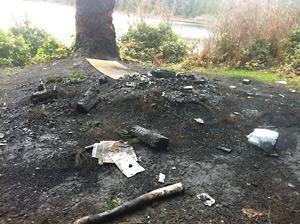BC’s Conservation Officer Service has received a number of complaints in the last several months about the burning of tires and other waste materials at local recreation areas.
Some of these locations are immediately adjacent to Duck Lake. “It seems to be a weekend problem, Friday or Saturday nights, and may be associated to bush parties,” said Andrew Anaka, conservation officer in the Powell River office. “Often we are seeing multiple tires, paint cans, roofing material, fibreglass, couches and mattresses burned.”
People breathing smoke from the fires are endangering their own health, Anaka pointed out. “The smoke from these toxic substances is also harmful to the environment. The ash and residue leach into water courses, polluting them as well. Anyone subsequently using the fire pits, even after any visual evidence of the burning has been cleaned up, can be negatively affected as well.”
Tires are made up of rubber and petroleum products containing 17 types of heavy metals, including bromine, lead, mercury and many other organic substances. Such metals are not only carcinogenic but also lead to many other health hazards, like poisoning. When tires are burned, the metals are released to the atmosphere and can easily enter the human body. Tires are composed of organic materials and burning them produces harmful gases like benzene, styrene and 1, 2, 3-butadine.
Burning tires causes long-term harm to the environment and public health. The dust of the debris and burnt materials remains for days and people are re-exposed to the substances if they breathe in the particulate matter even days after the burning.
When the residue of these toxic materials is washed away by rainwater, it also pollutes lakes and streams. Heavy metals in the tires never disappear and are just as hazardous to plants and animals found in water.
Water containing heavy metals is unfit for drinking and cooking. Lang Creek, which flows out of Duck Lake, is a source of domestic water for many people in the Kelly Creek area. It also disturbs the ecosystem. Duck Lake has a healthy population of cutthroat trout and supports a popular fishery. The area is also popular with hikers, bikers, dog walkers and mushroom pickers.
The service will be stepping up patrols in these areas in the evenings and on weekends and working cooperatively with Natural Resource Compliance Officers.
Persons found burning unauthorized materials, other than wood, or causing pollution could receive a $575 ticket or be summoned to court and face up to a $1-million fine and six months in jail as provided for in the Environmental Management Act.
Anyone with information should contact the Conservation Officer Service 24-hour reporting line at 1.877.952.7277 (RAPP).



